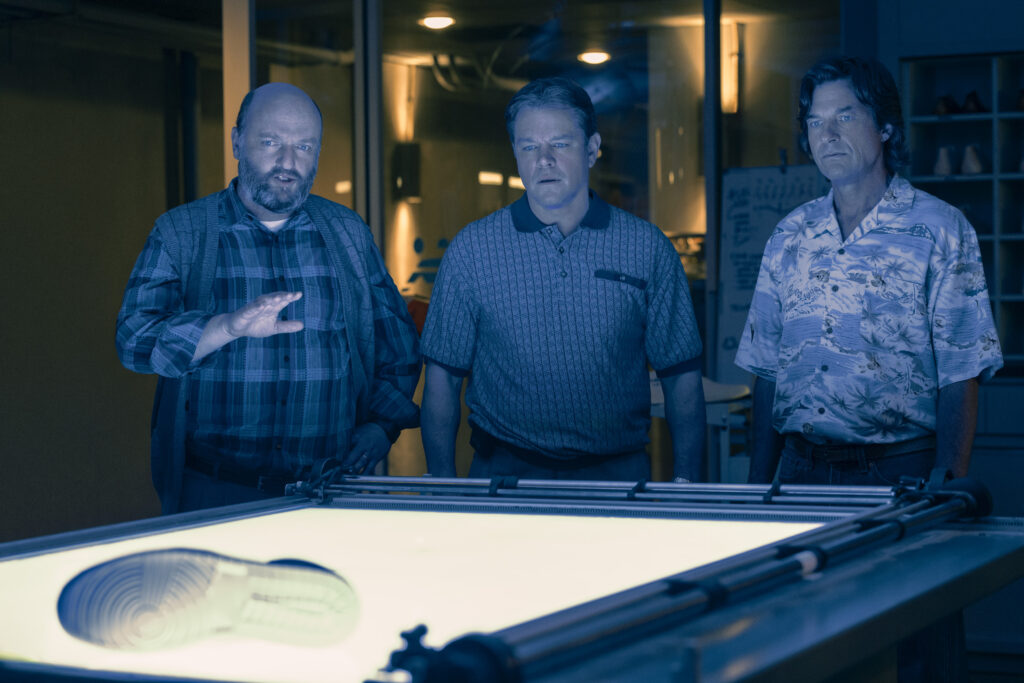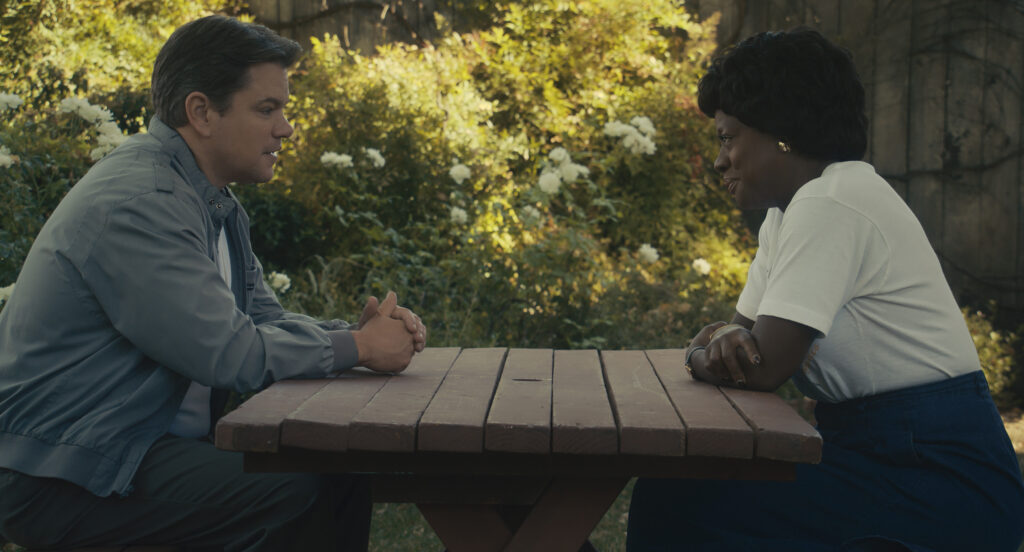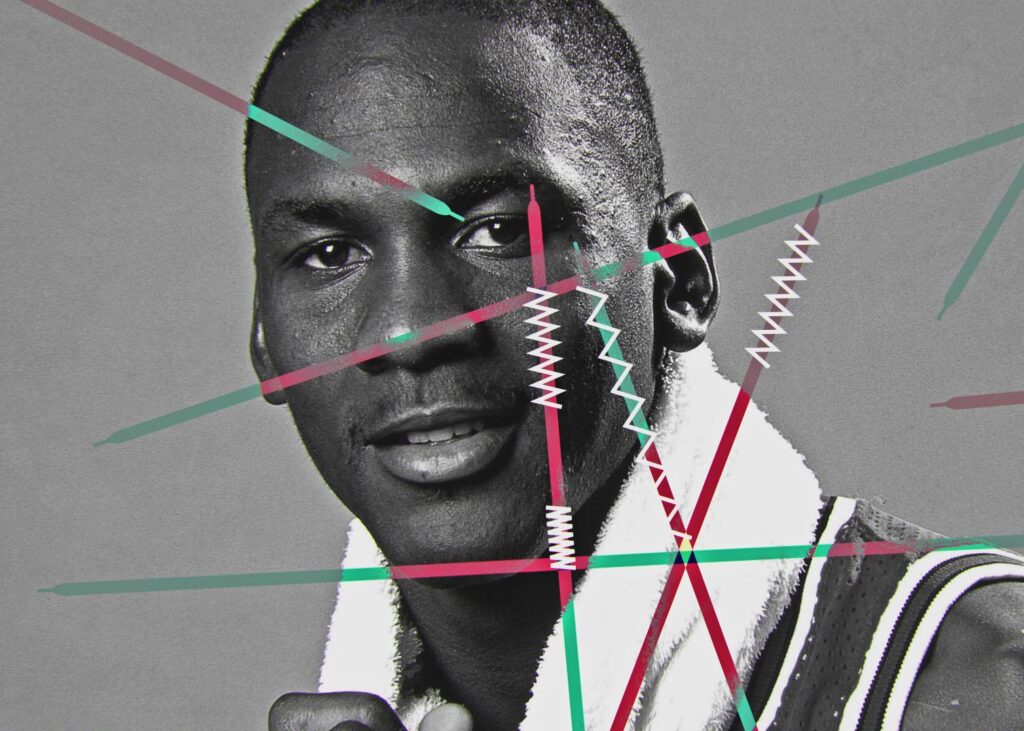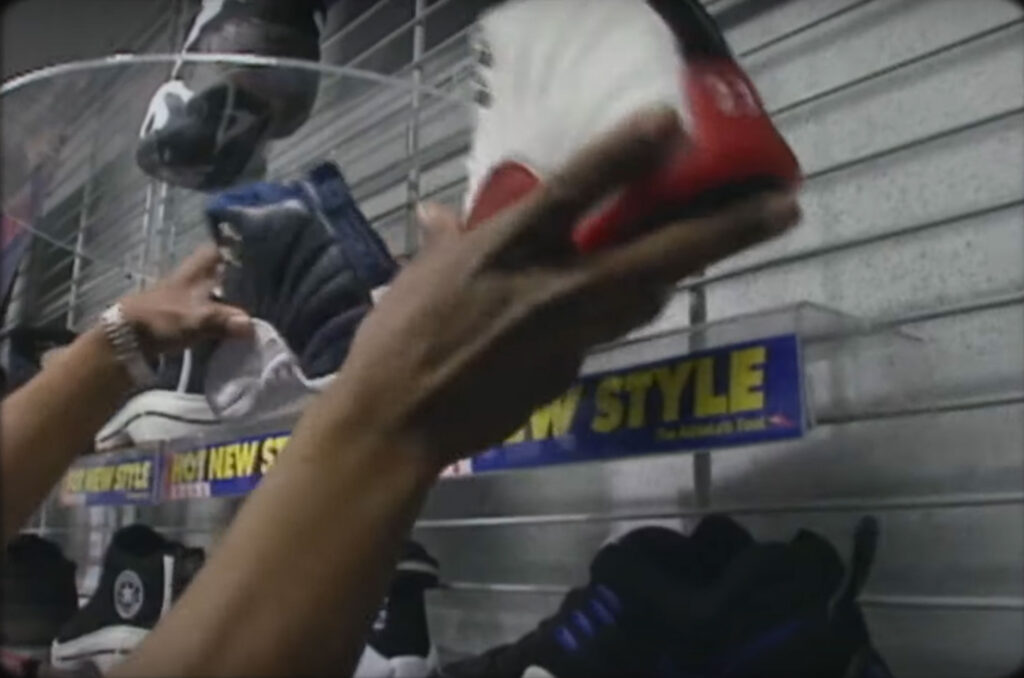March 28, 2023
by Carla Hay

Directed by Ben Affleck
Culture Representation: Taking place in 1984, primarily in Oregon and in North Carolina, the dramatic film “Air” features a predominantly white group of people (with some African Americans) representing the working-class, middle-class and wealthy.
Culture Clash: Against the odds, Nike executives convince a young Michael Jordan to sign with Nike, which makes a historic deal to create the Air Jordan shoe brand entirely around him.
Culture Audience: Besides appealing to the target audience of fans of Michael Jordan, Air Jordan shoes and the movie’s headliners, “Air” will appeal primarily to people who are interested in watching movies about landmark business deals, from the perspectives of the business executives.

“Air” is designed to be an awards-bait movie with mass appeal, but it has a very selective agenda in which characters get the most importance in the story. This dramatic origin story of the Air Jordan business hits many familiar beats of sports underdog movies. The acting and writing are engaging, but Michael Jordan is a sidelined character. His mother is at least given credit for being a smart dealmaker. “Air” had its world premiere at the 2023 SXSW Film and TV Festival.
Directed by Ben Affleck and written by Alex Convery, “Air” takes place in 1984, in the months leading up to the September 1984 launch of Nike’s very first Air Jordan shoes, also known as Air Jordan 1. According to several reports, Nike (which is headquartered in Beaverton, Oregon) had $5 billion in sales from Jordan Brand (Nike’s division Air Jordans shoes) in 2022. In “Air,” the underdogs and main heroes of this sports story are not athletes but the Nike executives who played crucial roles in conceiving and launching this industry-changing athletic shoe brand. It’s a very feel-good, slanted view of a fascinating story, but “Air” is a scripted drama, not a documentary.
The main protagonist of “Air” is Sonny Vaccaro (played by Matt Damon), a Nike basketball recruiter who’s been mainly working with the National Collegiate Athletic Association (NCAA) in selling Nike basketball shoes. Vaccaro is often credited with being the person who came up with the idea to have Nike pay NCAA colleges to have their basketball teams wear Nike shoes as product endorsements meant to influence people to buy the shoes. This type of product endorsement is now commonplace in the NCAA.
Sonny is passionate about basketball. And because he is deeply entrenched in NCAA basketball, he has a knack for being able to predict which NCAA players will be the top recruits by the National Basketball Association (NBA). But getting the top recruits for Nike endorsement deals requires a lot of money that Nike doesn’t have. The problem is that in 1984, Nike is financially struggling from decreased sales and massive money losses.
In terms of basketball shoe sales, Converse was the market leader at the time, with 54% of the market share, according to a statistic mentioned in “Air.” Converse had endorsement deals with NBA stars such as Magic Johnson and Larry Bird. Adidas, which was Converse’s closest competition in 1984, was popular with hip-hop stars, such as Run-DMC. Adidas was also Jordan’s first choice on where he wanted to sign an endorsement deal as a 21-year-old rookie for the Chicago Bulls.
Meanwhile, in 1984, Nike had only 17% of the market share for basketball shoe sales before the historic deal with Jordan. Nike also had an image and reputation of being an outdated company whose specialty was shoes for joggers. Basketball fans come in all different races, but NBA basketball is mostly played by African Americans. As Nike vice president of athlete relations Howard White (played by Chris Tucker), who is African American, half-jokingly comments in the movie: “Black people don’t jog.”
Nike vice president of marketing Rob Strasser (played by Jason Bateman) isn’t as passionate about basketball as Sonny is, but he is passionate about making profits from his marketing ideas. Rob is cynical about Nike’s office politics, and he has a world-weary attitude about him. He gives the impression that he is very annoyed with being part of a losing company, but he doesn’t want to quit Nike because he’s convinced that he can be part of the team that turn things around for Nike. Privately, Rob is afraid that no other company would hire him if he wanted to leave Nike.
“Air” makes a point of showing that middle-aged Sonny (a bachelor with no children) is at a crossroads in his life and at Nike. Sonny’s life revolves around Nike, which is in a slump. And he’s got a lot to prove, because Sonny’s self-esteem is very wrapped up in his job. Observant viewers will also see that Sonny likes to gamble a lot in his free time, which is a possible addiction that the movie never really explores. The parallels are obvious: Sonny is about to make the biggest gamble in his career with the Jordan deal.
Someone else who’s also got a lot to prove is Nike founder/CEO Phil Knight (played by Affleck), who is exactly the type of upper-class jogger that Nike has been courting for years. But there’s no denying that basketball shoes will be a driving force of sales for athletic footwear. Nike has been slow to adapt. Sonny says to Phil: “Basketball is the future.” Phil is skeptical: “Basketball is dead.”
In a Nike executive meeting that includes Sonny, Rob and a few other employees, Rob asks everyone in the room who their top choices are for NBA recruits who should be pursued by Nike. Sonny wants Jordan. Sonny also gets frustrated because everyone else names safe choices of basketball players who probably won’t achieve greatness. Sonny berates the employees by saying: “I have no tolerance for people who have no insight.”
In the men’s restroom, Rob tells Sonny that Sonny should be more diplomatic in these meetings. Sonny brushes off this advice. He is determined to sign Jordan and will do whatever it takes. Sonny thinks Nike should be spending even more money on the Jordan deal, while Phil wants to spend less.
Part of Sonny’s goal includes persuading Phil to spend Nike’s entire $500,000 recruiting budget on Jordan, before Jordan even starts playing for the Bulls. It’s unprecedented. And at the time, its seems like more than a big risk. It seems like financial suicide for Nike.
Sonny reminds Phil that Phil took a big risk by founding Nike. And he needs Phil to take a big risk on Sonny’s gut instinct that Jordan is the one and only NBA player that Nike should sign for this basketball season. Sonny tells Phil that if Sonny is wrong about Jordan, then Sonny will probably resign from Nike.
Sonny’s enthusiasm (or obsession) to sign Jordan means that Sonny inevitably offends people with his aggressive tactics. One of those people is Jordan’s agent David Falk (played by Chris Messina), a fast-talking, foul-mouthed New Yorker, who has some of the funniest scenes in the movie when he has raging meltdowns every time Sonny bypasses David to try to close the deal. David makes threats to Sonny that’s just a lot of empty, blustering talk. David is also one of the naysayers who thinks that Nike won’t be able to afford Jordan. In real life, Falk is credited with coming up with the name Air Jordan, but “Air” pokes a little fun at this claim to fame.
As part of his preparation for the deal, Sonny watches footage of Jordan’s college games and figures out the inner workings of Nike’s competition. He also gets some important advice from Jordan family associate George Raveling (played by Marlon Wayans), who was an assistant coach of the U.S. Olympics basketball team at the time. It’s a short but well-acted scene in the movie, where George tells Sonny a memorable story about being in the crowd during Martin Luther King Jr.’s famous 1963 “I Have a Dream” speech during the March on Washington.
“Air” depicts Sonny as being inspired to create an entire Nike shoe line around Jordan after Sonny sees an old TV ad with tennis star Arthur Ashe talking about his custom-made tennis shoes that have been replicated for people to buy. Ever the wheeler dealer, Sonny makes a bold move to pitch the idea directly to Jordan’s parents Deloris Jordan (played by Viola Davis) and James Jordan (played by Julius Tennon), by driving to the Jordan parents’ home in Wilmington, North Carolina, and showing up unannounced. (Davis and Tennon are married in real life.) Deloris is the outspoken and savvy business person of the couple, and she makes the best power play in the entire story.
And where is Michael Jordan during all of these schemes and deals that wouldn’t exist without him? “Air” depicts Michael Jordan (played by Damian Young) as an occasional bystander who says very little in this story, and he is mostly filmed with his back to the camera. There’s some archival footage of the real Michael Jordan, but the screen time in “Air” for these clips is also very brief.
In the production notes for “Air,” director Affleck explains this choice: “Michael Jordan is so famous that I truly felt if we ever saw an actor playing [him], it would be hard to get the audience to suspend their disbelief, because, in my opinion, there’s no convincing anybody that someone who isn’t Michael Jordan is Michael Jordan. We felt a more interesting way to tell the story would be for him to exist in the ether of the movie. To be talked about by everyone but not seen is somewhat analogous to the experience of celebrities and sports stars in modern life, because most people go their whole lives without ever meeting or seeing their favorite sports star or celebrity in person. So we only see Michael in clips and flashes. We don’t ever fully see him in person because to see him in person would be to put his feet on the ground in a way that the movie doesn’t want to do.”
In other words, Affleck didn’t want any character to overshadow the Sonny character, played by Affleck’s longtime friend Damon. (Affleck and Damon are two of the producers of “Air.”) The fact of the matter is that this movie could have shown a little bit more respect for Michael Jordan’s role in this monumental deal. The “Air” movie depicts Michael Jordan as mostly caring about getting a new red Mercedes 380SL as part of the deal, while his parents (especially his mother) did almost all of the talking for him. It’s hard to believe that Michael Jordan didn’t speak more in these business meetings.
Another thing that looks very fabricated for the movie is how the first Air Jordan design came about, because it’s depicted as a “race against time” over a weekend to get a prototype ready in time for a Monday meeting with Michael Jordan and his parents. It’s the prototype for the shoe that would become Air Jordan 1. Peter Moore (played by Michael Maher) is portrayed as the artistic visionary who came up with the design for the shoe all by himself. The movie mentions a team of designers who worked with Peter to bring his vision to life, but these team members are nowhere to be seen in “Air.”
It’s another misstep that doesn’t properly acknowledge the contributions of an untold number of real-life people who were essential members of the team. “Air “didn’t have to single out all of these people in the movie, but they could have at least been characters seen in the movie as background extras. It’s odd that with so much of Nike’s Air Jordan deal riding on the actual product (the shoes), so little thought in the movie is given to the shoemakers who helped make the first Air Jordans a reality. Instead, “Air” makes it look like it was only Peter Moore in a Nike shoe design room who created the first Air Jordan.
What “Air” does get right is having an infectious energy in the behind-the-scenes drama that went into making this deal happen. The dialogue is snappy and intelligent but accessible. And the performances, especially from Damon and Davis, are above-average for movies of this type of subject matter. “Air” also has excellent soundtrack choices, with well-placed pop songs from the 1980s, such as Bruce Springsteen’s “Born in the USA,” Night Ranger’s “Sister Christian,” Chaka Khan and Rufus’s “Ain’t Nobody” and Squeeze’s “Tempted.” The movie also has Dire Straits’ “Money for Nothing,” which actually wasn’t released until 1985, but that’s a minor dateline error in an otherwise commendable soundtrack.
A movie like “Air” obviously wants to be more important than just a story about how Nike made a comeback by signing a young Michael Jordan in what would turn out to be the most lucrative celebrity endorsement deal in athletic shoe history. (For a deep dive into the cultural impact of Air Jordans, the 2020 documentary “One Man and His Shoes” is worth seeing.) The story depicted in “Air” serves as an example of how some of the best risks are taken by people who’ve got a lot to lose but take the risks anyway. It’s too bad that Michael Jordan’s perspective of this inspirational story is completely erased from the movie.
Amazon Studios will release “Air” in U.S. cinemas on April 5, 2023. Prime Video will premiere the movie on May 12, 2023.


